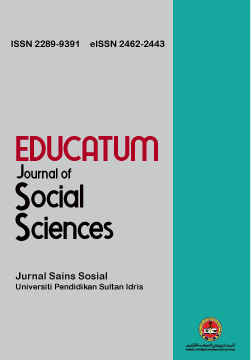Modularizing an Acting Imagination Activity for Malaysian Secondary School Theatre Activities
DOI:
https://doi.org/10.37134/ejoss.vol9.1.6.2023Keywords:
Acting module, Malaysia secondary school’s theatre, imagination, acting techniques, cognitive capacitiesAbstract
The primary aim of this study was to develop an Acting Imagination Activity Module that can effectively augment cognitive capabilities within the context of secondary school theatre co-curricular activities. The development of this activity module is grounded in the incorporation of imagination techniques developed from Stella Adler's Acting Theory, Constructivism Theory, and Richey and Klein's DDR Model. The assessment of the module's usability is carried out over two cycles, applying the Delphi Method. The findings obtained from the needs analysis and literature review suggest a dearth of specialized modules and reference materials employed for theatre co-curricular activities, particularly in the context of acting in Malaysian secondary schools. Moreover, the primary objective of developing and implementing this activity module was to augment students' cognitive capacities, in accordance with the National Education Philosophy and Student Aspirations. The objective of this research was to develop an Acting Imagination Activity Module that prioritizes the utilization of imagination techniques to augment the cognitive capacities of pupils and evaluate the applicability of the Acting Imagination Activity Module as a tool for overseeing theatre co-curricular activities in secondary schools within the context of Malaysia. The incorporation of theatrical elements into educational settings was expected to have a positive impact on the cognitive capacities of students, consequently promoting the cultivation of comprehensive human resources. The goal of this strategy was to foster critical thinking, creativity, innovation, and strong student ambitions, in accordance with the goals outlined in the Malaysian Education Development Plan 2013-2025.
Downloads
References
Abdullah, Z. (2019, May 1). Sejarah Penubuhan Program Minor Teater Dalam Pendidikan UPSI (N. Suhaimi, Interviewer) [Review of Sejarah Penubuhan Program Minor Teater Dalam Pendidikan UPSI].
Ahmad, F., Mohd Lazim, Z., & Ibrahim, K. (2010). KOMSAS: Penguasaan, konflik dan harapan pelajar [Review of KOMSAS: penguasaan, konflik dan harapan pelajar]. Jurnal Linguistik, 10(Special Edition), 118–136. Persatuan Linguistik Malaysia. issn: 1823-9242
Babbage, F. (2004). Agusto Boal (Routledge Performance Practitionars). Florence Production Ltd.
Briner, M. (1999). Learning Theories. Denver: University of Colorado.
Boal, A. (2008), Theatre of the oppressed London: Pluto Press.
Jalal, F., & Omar, A. (2014). Aktiviti Lakonan Murid bagi Pemupukan Nilai Murni dan Perpaduan Kaum: Analisis di Pekan, Pahang: Acting Activities among Pupils inInculcating Good Values and Ethnic Integrity: An Analysis in Pekan, Pahang. Perspektif Jurnal Sains Sosial Dan Kemanusiaan, 6(2), 26–41. Retrieved from https://ojs.upsi.edu.my/index.php/PERS/article/view/1661
Johnson and Onwuegbuzie (2004). Mixed methods research: a research paradigm whose time has come. Educational Researcher 33(7), 14–26.
Gamwel, P. (2005). Intermediate students' experiences with an art-based unit: An action research. Canadian Jumal Of Education.
Greene, J (2008). Is mixed methods social inquiry a distinctive methodology? Journal of Mixed Methods Research 2, 7–22.
Hussain Chin, L. F. (2020). Akulturasi Dan Neo Budaya Dalam Drama Pascakolonial Malaysia: Evolusi Identiti Kebangsaan [PhD Thesis Akulturasi Dan Neo Budaya Dalam Drama Pascakolonial Malaysia: Evolusi Identiti Kebangsaan]. http://eprints.usm.my/55610/
Moore, M. M. (2004). Using drama as an effective method to teach elementary students. Michigan: Eastern Michigan University.
Nur Nina Zuhra. (1992). An analysis of modern Malay drama. Biroteks, Institut Teknologi Mara.
Seni Kreatif Programme, USM, Penang. (n.d.). Retrieved February 18, 2023, from https://myartseducationarchive.com/selected-programs/seni-kreatif-programme-usm-penang/
Richey, R. C., & Klein, J. (2007). Design and Development Research: Methods, Strategies, and Issues. Mahwah, NJ: Lawrence Erlbaum Associates, Publishers.
Tashakkori and Teddlie (2010). SAGE Handbook of Mixed Methods in Social and Behavioral Research, 2nd ed., Thousand Oaks, CA: Sage.
Thambu, N. (2014). Penggunaan teater forum dalam pengajaran dan pembelajaran pendidikan moral di sekolah menengah/Nadarajan a/l Thambu (Doctoral dissertation, University of Malaya).
Wooster. (2007). Contemporary theatre in education. Intellect.
Downloads
Published
How to Cite
Issue
Section
License
Copyright (c) 2023 Nadhilah Suhaimi, Lena Farida Hussain Chin, Zaharul Lailiddin Saidon

This work is licensed under a Creative Commons Attribution-NonCommercial-ShareAlike 4.0 International License.





